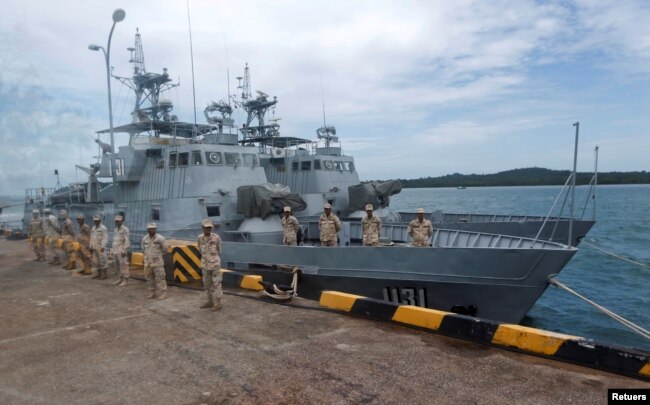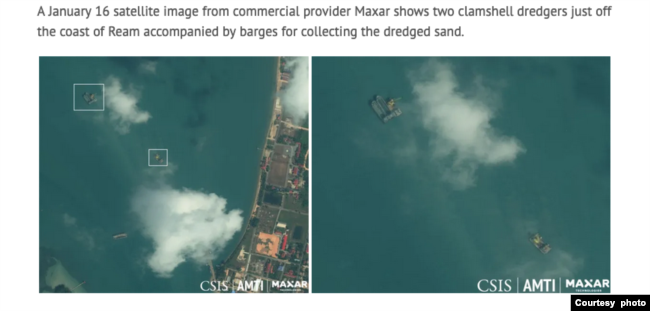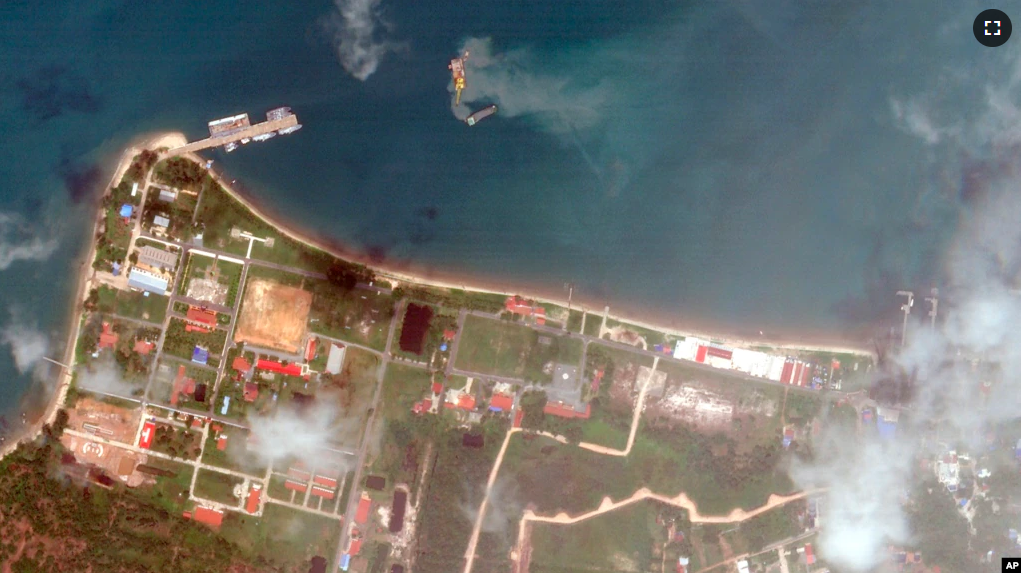Cambodia has denied that it will permit any Chinese military presence after the expansion of its naval base on the Gulf of Thailand.
On Tuesday, government spokesman Phay Siphan described the expansion of the Ream Naval Base as “cooperation between China and Cambodia.” He said the Chinese ambassador to Cambodia, along with Cambodia’s defense minister and top military officials, will lead the groundbreaking ceremony on Wednesday.
However, he denied a report in The Washington Post newspaper that said an area on the northern side of the Cambodian naval base would be used in part by the Chinese military. The newspaper said the information came from an unnamed Chinese official.
Siphan said it would be a violation of Cambodia’s constitution to host a foreign military power and there had been no change in the country’s agreement with China.
“I think that’s a strong accusation,” he told the Associated Press.
Chinese Foreign Ministry spokesperson Zhao Lijian on Tuesday said the work would be a “renovation” of the Ream Naval Base. The aim of the project, he added, is to “strengthen the Cambodian navy’s capability.”
But the expansion of the base has led to concern in the United States and Asia-Pacific countries that it will become a port for Chinese naval forces.

Ream is on the Gulf of Thailand, near the South China Sea. China has claimed nearly all of the waterway. Several nations, including Vietnam, Malaysia, Brunei and the Philippines, also have claims in the area.
The U.S. has refused to recognize China’s claim and carries out what it calls freedom of navigation exercises. The goal is to establish that the area remains international waters.
A Chinese base in Cambodia would be close to the important Malacca Strait. Ships sailing between the South China Sea and the Indian Ocean pass through the strait.
U.S. State Department spokesman Ned Price on Monday confirmed reports of Chinese building activities at Ream Naval Base. He added that the Chinese “military presence at Ream could threaten Cambodia’s autonomy and undermine regional security as well.”
China recently signed a security deal with the Solomon Islands and tried to reach agreements with other South Pacific island nations.
Zhao, the Chinese foreign ministry spokesman, accused the U.S. of “bullying” Cambodia. He said it was ignoring Cambodia’s denial that Ream would be used for Chinese military purposes. He also noted the U.S. network of military bases around the world.

The United States has more foreign military bases than any other country, including several in the Asia-Pacific area.
China has said it has one foreign military base in the African country of Djibouti. But observers believe that China is establishing its own foreign military network without using the term “base.”
Cambodia’s leader, Hun Sen, has long had close ties with China. He reportedly signed a secret agreement in 2019 permitting the Chinese to establish a base at Ream.
China has already been dredging the port to let larger ships enter. It is building new structures on the naval base. Last month, Hun Sen suggested that the water was still not deep enough for any warships.
“Why would we need foreign forces, for what?” “What Cambodia really needs at the moment is foreign investment, not foreign forces ,” he said.
The Asia Maritime Transparency Initiative shared satellite images in January of two machines working in the harbor. The group is part of the Center for Strategic and International Studies based in Washington, D.C. It said Ream could only hold small ships at this time. But it added: “A deep-water port would make it far more useful to both the Cambodian and Chinese navies.”
I’m Ashley Thompson.
David Rising and Sopheng Cheang reported this story for the Associated Press. Hai Do adapted it for VOA Learning English.
___________________________________________________________________
Words in This Story
groundbreaking –adj. describes a ceremony marking the beginning of a building project
renovation –n. to make changes and repairs to something that is old (such as a house or building) so that it is in good condition again
autonomy –n. the power or right of a country to govern itself
bullying –n. the act frightening or threatening someone who is weaker
dredge –v. to remove dirt and mud from the bottom of a lake or river to deepen it
We want to hear from you. Write to us in the Comments section, and visit
